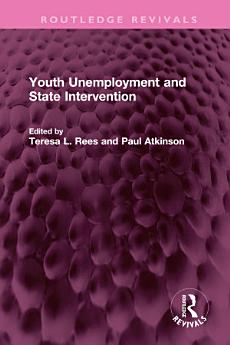Youth Unemployment and State Intervention
Meer oor hierdie e-boek
Originally published in 1982, this volume of essays identifies a number of key issues in the pattern of state response to youth unemployment which had evolved in the inter-war and post-war periods. The contributors discuss a number of related themes, such as how the problem has been defined and created as a kind of ‘moral panic’, and how contemporary measures recapitulate the rhetoric and policies of pre-war interventions. They examine the relationship between youth unemployment measures and the education sector, the responses of the trade unions, and also consider how young people themselves respond to special programmes. A critical assessment is made of the further education elements in the special measures: in particular, the question is asked: do these young people need ‘social and life skills’ training? The book charts the changing nature of the state response to youth unemployment since 1974, and stresses throughout the inappropriate nature of ‘temporary’ amelioration of a long-term, even permanent, problem.




